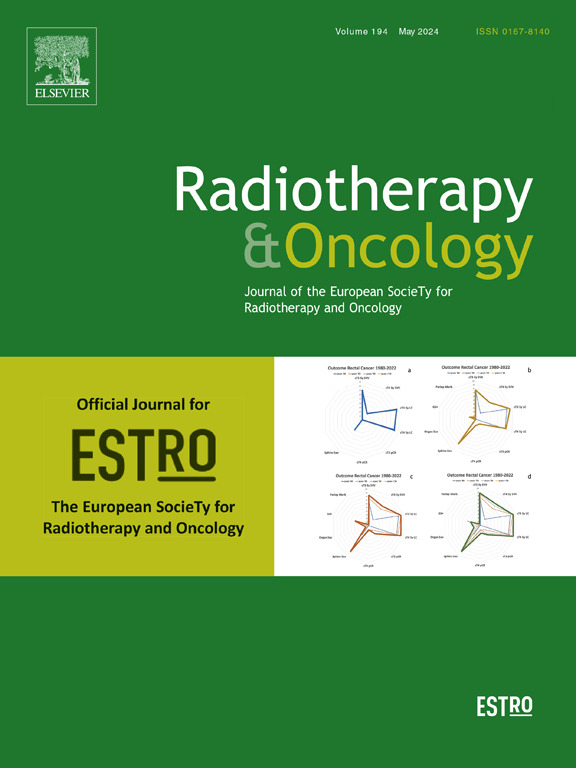前瞻性随机EORTC-1219/DAHANCA-29试验的放疗质量保证:个案回顾分析
IF 5.3
1区 医学
Q1 ONCOLOGY
引用次数: 0
摘要
背景:EORTC-1219/DAHANCA-29试验研究了在加速放疗(RT)和化疗中加入尼莫唑是否能改善局部晚期头颈癌的局部控制。作为试验RT质量保证(RTQA)计划的一部分,对RT计划进行个案审查(ICR),以评估方案的依从性和治疗计划的质量。材料和方法:19个中心提交了RT计划供中央审查。该试验要求每个机构对前5名患者进行前瞻性ICR (p-ICR),并对后续计划进行回顾性审查或作为可选的p-ICR。放射肿瘤学家和医学物理学家对计划进行了审查。在p-ICR中被认为不可接受的计划被重新提交审查,而回顾性ICR (r-ICR)病例被审查一次。计划被分类为“按协议可接受”、“可接受的变化”或“不可接受的变化”。结果:对所有194例随机患者的放疗计划进行了回顾,其中174p-ICRs和44例r-ICRs。p-ICR的划定可接受率从首次提交时的69%提高到最终审查时的93%。p-ICR的接受率(90%)比r-ICR(73%)高18%。在首次和最终提交时,剂量和计划可接受性仍然很高(97%),p-ICR和r-ICR之间的差异很小。结论:P-ICR显著提高了CTV描绘质量,确保了更高的方案依从性和治疗计划准确性。p-ICRs被推荐用于复杂的治疗,适合于单个部位的表现。本文章由计算机程序翻译,如有差异,请以英文原文为准。
Radiotherapy quality assurance of the prospective randomised EORTC-1219/DAHANCA-29 trial: an individual case review analysis
Background
The EORTC-1219/DAHANCA-29 trial investigated whether adding nimorazole to accelerated radiotherapy (RT) and chemotherapy improves locoregional control of locally advanced head and neck cancer. As part of the trial’s RT quality assurance (RTQA) program, individual case review (ICR) of RT plans was performed to assess protocol compliance and treatment planning quality.
Materials and methods
Nineteen centers submitted RT plans for central review. The trial mandated prospective ICR (p-ICR) for the first five patients per institution, with subsequent plans reviewed retrospectively or as optional p-ICR. Plans were reviewed by radiation oncologists and medical physicists. Plans deemed unacceptable in p-ICR were resubmitted for review, whereas retrospective ICR (r-ICR) cases were reviewed once. Plans were categorized as “Acceptable as per protocol,” “Acceptable variation,” or “Unacceptable variation.”.
Results
RT plans for all 194 randomized patients were reviewed, with 174p-ICRs and 44 r-ICRs. The delineation acceptability rate for p-ICR improved from 69% at the first submission to 93% at final review. p-ICR had an 18% higher acceptance rate (90%) compared to r-ICR (73%). Dose and plan acceptability remained high (97%) at both first and final submission, with minimal differences between p-ICR and r-ICR.
Conclusion
P-ICR significantly improved CTV delineation quality, ensuring higher protocol compliance and treatment planning accuracy. p-ICRs are recommended for complex treatments, tailored to the performance of individual sites.
求助全文
通过发布文献求助,成功后即可免费获取论文全文。
去求助
来源期刊

Radiotherapy and Oncology
医学-核医学
CiteScore
10.30
自引率
10.50%
发文量
2445
审稿时长
45 days
期刊介绍:
Radiotherapy and Oncology publishes papers describing original research as well as review articles. It covers areas of interest relating to radiation oncology. This includes: clinical radiotherapy, combined modality treatment, translational studies, epidemiological outcomes, imaging, dosimetry, and radiation therapy planning, experimental work in radiobiology, chemobiology, hyperthermia and tumour biology, as well as data science in radiation oncology and physics aspects relevant to oncology.Papers on more general aspects of interest to the radiation oncologist including chemotherapy, surgery and immunology are also published.
 求助内容:
求助内容: 应助结果提醒方式:
应助结果提醒方式:


